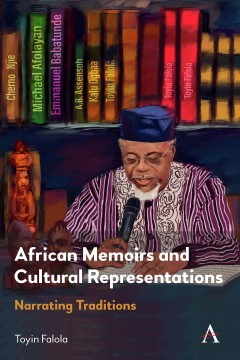African Memoirs and Cultural Representations
Narrating Traditions
By Toyin Falola
Other Formats Available:
- About This Book
- Reviews
- Author Information
- Series
- Table of Contents
- Links
- Podcasts
About This Book
Oral traditions and creative oratures have been celebrated in African studies over the years, specifically from the 1950s, as the most important and viable correspondence, aside from material artifacts, between social “archeologists” attempting to penetrate the African preliterate past and the social-political and economic productions of that same past.
In the memoirs chosen for this book, oral traditions are braided with personal experiences in the formation of the self, providing the basis of some African literary outputs and championed as having the ability to engineer the African knowledge system in global academe. In this regard, this work stressesthe concept that most memoir writing scholars feel that the production and presentation of the autobiographical self aredependent on the categories of individualism and relationality.
The memoirists depict their own identities in their tales as not simply a part of their society but also one strongly impacted by prominent persons in their many lived settings. The bookdiscusses an approach that enables West African memoirists to review their cultural backgrounds in the light of living in other spaces and acquiring different experiences.
Reviews
“African Memoirs and Cultural Representations presents an encyclopedic repository containing transitions of African multidimensional identities—personal, political, social, and cultural. From the politics of memory, to the nuances of everyday life, the universal and particular converge in this philosophical reflection and creative synthesis of the African memoir by Toyin Falola”—Prof Mobolanle E Sotunsa, Professor of African Oral Literature and Gender Studies, Babcock University, Nigeria.
“This book is arguably about the retrieval, projection, and dissemination of African voices. As most times with Toyin Falola’s reflections, the anti-colonial stance is implicit, nuanced, and understated. But this guarded celebration of African subjectivities is far more effective than it would appear on the surface. It veers into the very real issue of African diversity, core underlying epistemological assumptions and the ability to transcend delimiting ethnic and geographical demarcations. Once again, Falola reestablishes his astonishing versatility”—Sanya Osha, University of Cape Town, South Africa.
“African Memoirs and Cultural Representations by Toyin Falola presents an excellent assessment of the critical role of West African memoirs and their interconnectivity to various realms of African society, including the political, economic, social, and cultural realms. The book brilliantly interrogates the challenging work of the memoirists as they juxtapose their ideas within the much broader context of changing societal values, traditions, and expectations of the prevailing political and social orders”—Bessie House-Soremekun, Ph.D., Interim Dean and Professor of Political Science, College of Liberal Arts, Jackson State University, USA.
Author Information
Toyin Falola is an author and editor of over one hundred and fifty books on Africa and the African Diaspora, and widely proclaimed as Africa’s preeminent scholar and one of the major intellectuals of our time. A global icon in African Studies, Toyin Falola has received sixteen honorary doctorates.
Series
Anthem Advances in African Cultural Studies
Table of Contents
List of Figures; Dedication; Acknowledgments; Preface; Chapter One Mirror Effect: Narrating the Self through, Traditions and Cultures; Chapter Two The Universal and the Particular in African Memoirs; Chapter Three The Portraiture of Womanhood in Emmanuel, Babatunde’s An African Journey through Celibate, Priesthood to Married Life; Chapter Four Politics, Philosophical Representation, and Culture in Cherno Njie’s Sweat Is Invisible in the Rain; Chapter Five The Yoruba Worldview, Meanings, and Ideals of Life in Michael Afolayan’s Fate of Our Mothers; Chapter Six The Indelibility of Igbo Tradition (Home) in Kalu Ogbaa’s Carrying my Father’s Torch; Chapter Seven Experiences, Reflections, and Refractions on the Cusp in A. B. Assensoh’s A Matter of Sharing; Chapter Eight Toward a Spatial and Identity Synthesis: Regional Peculiarities in African Memoirs; Bibliography; Index
Links
Stay Updated
Information
Latest Tweets



